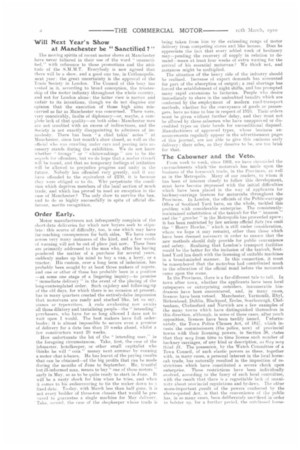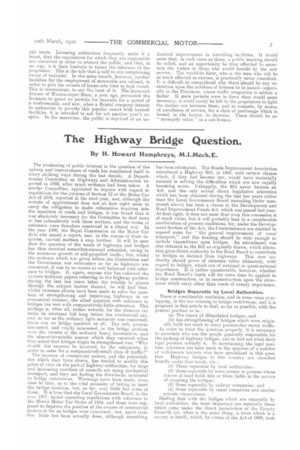The Cabowner and the Veto.
Page 2

Page 3

If you've noticed an error in this article please click here to report it so we can fix it.
From week to week, since 1903, we have chronicled the cncroachments which •the motorcah has made upon the business of the horse-cab trade, in the Provinces, as well as in the Metropolis. Many of our readers, TO W110111 it has been of interest closely to follow this development, must have become impressed with the initial difficulties which have been placed in the way of applicants for hackney-carriage licences for motorcabs Throughout the Provinces. In London, the officials of the Public-carnage Office of Scotland Yard have, on the whole, tackled this problem with considerable enterprise. The consistentlymaintained substitution of the taxicab for the " hansom " and the" growler" in the Metropolis has proceeded apace ; it has been restricted by few serious official fiats (we omit the " Henry Howler," which is still under consideration, where we hope it may remain), other than those which have been deemed necessary in order to ensure that the new methods should duly provide for public convenience and safety. Realizing that London's transport facilities would be the better for the inclusion of the taxicab, Scotland Yard has dealt with the licensing of suitable machines in a broad-minded manner. In this connection, it must be remembered that the motorbus had contributed much to the education of the official mind before the motoreab came upon the scene. In the Provinces, there is a far-different tale to tell. In town after town, whether the applicants have been local ratepayers or enterprising outsiders, innumerable hindrances have been encountered, and, in many eases, licences have been vetoed. Manchester, Yarmouth, Rhyl, Birkenhead, Dublin, Blackpool, Eccles, Scarborough, Cheltenham, Chelmsford and Norwich are a few examples of the many towns which have distinguished themselves in this direction, although, in some of these cases, after touch opposition, licences have been tardily issued, 'Unfortunately, the Town Police Clauses Act, of 1847, e hich invests the commissioners (the police, now) of provincial towns with their licensing powers, in Section 38, states that they may from time to time license such number of hackney carriages, of any kind or description, as they may think fit. The possession, by the Watch Committee of a Town Council, of such elastic powers as these, together with, in many cases, a personal interest in the local horsecab trade, has naturally resulted in the imposition of restrictions which have constituted a severe check upon enterprise. These restrictions have been individually evolved, according to the fancy of each local committee, with the result that there is a regrettable lack of unanimity about provincial regulations and by-laws. The other more-important ,sesult of the powers conferred by the above-quoted Act, is that the convenience of the public has, in so many cases, been deliberately sacrificed in order to bolster up. for a further period, the outclassed horse
cab trade. Licensing authorities frequently make it a boast, that the regulations for which they are responsible are conceived in order to protect the public, and that, in no way, is it their business to foster the interests of the proprietor. This is the tale that is told to any complaining owner of taxicabs! In the same breath, however, further facilities for the employment of motorcabs are refused, in order to give the owners of horse-cabs time to look round. This is inconsistent, to say the least of it. The horse-cab drivers of Weston-super-Mare, a year ago, persuaded the licensors to grant no permits for taxicabs for a period of a twelvemonth, and now, when a Bristol company intends to endeavour to provide this popular resort with taxicab facilities, it is intended to ask for yet another year's respite. In the meantime, the public is deprived of an un doubted improvement in travelling fa:q1ities. It would seem that in such cases as these, a public meeting should be called, and an opportunity be thus afforded to ascertain the wishes of those who would benefit by the new service. The would-be hirer, who is the man who will be as much affected as anyone, is practically never consulted. It is difficult to comprehend why there should be any restriction upon the numbers of licences to be issued—especially in the Provinces, where traffic congestion is seldom a factor. If more permits were in force than would seem necessary, it could surely be left to the proprietors to fight the matter out between them, and to compete, by means of excellence of service, for a class of patronage which is bound, in the future, to increase. There should be no " monopoly value " in a cab licence.




















